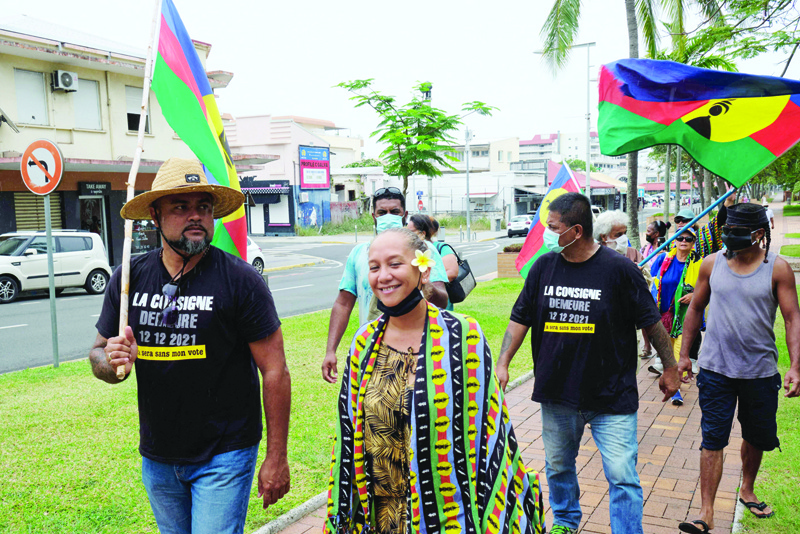 NOUMEA: Independentists demonstrate the morning after the self determination referendum in Noumea, in the French South Pacific territory of New Caledonia yesterday. – AFP
NOUMEA: Independentists demonstrate the morning after the self determination referendum in Noumea, in the French South Pacific territory of New Caledonia yesterday. – AFPNOUMEA: Pro-independence parties in New Caledonia yesterday rejected the result of a weekend referendum which overwhelmingly approved the Pacific territory remaining part of France, causing fears of political tension ahead. A statement from a coalition of pro-independence groups, which had boycotted the vote, said that they "do not recognise the legitimacy or the validity of this vote which was confiscated.
"This referendum did not respect the spirit or the letter of the Noumea accords", a reference to the agreement forming the legal basis of successive referendums on the island group's future. A total of 96.49 percent of Sunday's referendum votes were against independence, with only 3.51 percent in favour. But turnout was a mere 43.90 percent, with most of the archipelago's indigenous Kanak population heeding the boycott call.
Speaking earlier on the France Inter radio, France's minister in charge of overseas territories defended the result, saying it had full legal force. "Whatever the turnout level, legally speaking it's a vote that has the same weight as the two previous ones that returned a 'No' vote," Sebastien Lecornu said, referring to two previous referendums in 2018 and 2020. He admitted that "politically it means something: We need to look at this division."
Police on alert
French authorities pushed ahead with the referendum despite calls from pro-independence groups to delay the vote because of fears that COVID-19 would make a fair campaign impossible. Kanaks, who tend to favour independence, were also called by their traditional community leaders to observe a day's mourning on Sunday for those killed by the coronavirus.
Police reinforcements have been sent to the islands in case of unrest. About 2,000 officers were deployed for the vote, which passed off without incident. "The path of dialogue has been broken off by the stubbornness of a French government that is incapable of reconciling its geopolitical interests in the Pacific with its obligation to decolonise our country," the statement from the main independence groups such as FLNKS said.
President Emmanuel Macron noted "the high abstention rates" in a recorded message on Sunday, but he said that France could be "proud" of a more than 30-year process designed to settle the islands' status. Having rejected independence in 2018 and then again last year, islanders were called on Sunday to answer one last time whether they wanted New Caledonia "to accede to full sovereignty and become independent".
'A failure overall'
At stake in the vote was one of France's biggest overseas territories which is home to about 10 percent of the world's reserves of nickel, which is used to make stainless steel, batteries and mobile phones. The islands are also a key part of France's claim of being a Pacific power, with New Caledonia granting Paris rights to the surrounding ocean, as well as serving as a military staging post.
Experts suspect that an independent New Caledonia would move closer to Beijing, which has built up close economic links and political influence on other Pacific islands. Macron said that "a period of transition" would now start which is expected to result in Paris granting more political autonomy to the islands, which are split along ethnic lines between white Europeans and the indigenous population.
But some predicted a rocky road ahead. "The idea was to get a large number of voters to back a solution that overcomes divisions in the community. That hasn't happened," said Alain Christnacht, advisor to former prime minister Lionel Jospin and co-author of the accords paving the way for the referendums. "This vote is a failure overall and makes building a common destiny difficult," he wrote on his Facebook page.
Paul Fizin, a historian, said the different political groups were "looking towards different horizons". Philippe Michel, a local centre-right deputy, told AFP the "theory of two blocs has emerged strengthened from the referendum", adding: "It won't be easy to start talking again as both sides are digging their heels in." - AFP









